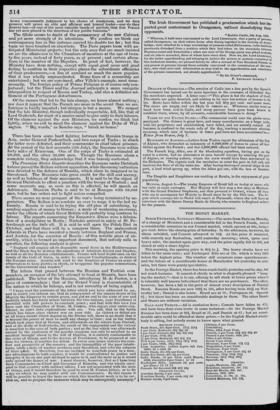There has been some hard fighting between the Russian troops
in Asia, under General Paskowitsch, and two corps of Turks ; in which the latter were defeated, and their commander in chief taken prisoner. At the period of the last accounts (5th July), the Russians were within forty miles of Erzeroum. One of the corps of Turks is estimated at 20,000, and the other 30,000 men. Though the Russians claim a complete victory, they acknowledge that it was bravely contested.
The Prussian States Gazette describes the Russians under Diebitsch to have passed the Balkan without opposition, while the enemy's attention was directed to the defence of Shumla, which alone he imagined to be threatened. The Russians take great credit for the skill and secrecy, as well as boldness of their movements. It is said to be the object of General Diebitsch to effect a junction with the troops at Siseholi; and some accounts say, as soon as this is effected, he will march on Adrianople. Hussein Pacha is said to be at Bourgas with 60,000 men, but he has orders not to fight unless compelled.
There seems no near prospect of the wars being terminated by ne- gociation. The Sultan is as resolute as ever to wage it to the last ex- tremity.- Russia is' said to be trying the old plan of subsidizing, by sending supplies of money to Greece ; a mode of weakening an enemy, under the effects of which Great Britain will probably long continue to labour. The reports concerning the Emperor's illness were a fabrica- tion of a stockjobber in Berlin ; Nicholas arrived in safety at St. Pe- tersburgh on the 30th ult. It is said he will open the Polish Diet in October, and that there will be a congress there. The malecontent Liberals in Paris have invented a treaty between England and France, and Austria, for the coercion of Russia : of this notable piece of ab- surdity, which is termed an important document, that nobody calls in question, the following analysis is given : " England will employ all its disposable naval force in the Mediterranean and the Black Sea to destroy the squadrons of Admirals Ricord and Hayden, as well as all the Russian establishments. France will land 30,000 men on the coasts of the Gulf of Saros, in order to. succour Constantinople, or destroy the Russian army. Austria will send to the frontiers of France an army of observation to keep parties in check, or to appease the popular commotions, as the Government may require."
The letters that passed between the Russian and Turkish corn wanders, on occasion of the late attempt to treat at Shumla, have been published. The letter of the Russian, introducing M. de Fonton, is a piece of commonplace ; that of the Grand Vizier is characteristic of the nation to which he belongs, and is not unworthy of being copied.
" I have read the contents of the letter which you have addressed to me, and in which you inform me, that in consequence of the sincere desire of his Majesty the Emperor to restore peace, and put an end to the state of war and hostility which has lately arisen between the two nations, your Excellency is provided with full powers to conclude peace ; and that with this view you have sent the Councillor of State, M. Forston, who enjoys your entire con- fidence, to enter into explanations with me. You add, that in the battle -which has taken place victory was on your side. As victory or defeat are at all times events which depend on the Divine will, there is no doubt that it is beyond the power of man to makb any change in time ; and in the battles -which took place first at Dewno, and afterwards on the return from Pravadi, and at the defile of Kulewtscha, the result of the engagement and the victory is manifest to the eyes of both parties ; and as the loss which was afterwards caused by the explosion of the powder-waggons can only be ascribed to an accident brought about by the will of Heaven, it is entirely conformable to the order of things, and to the decrees of Providence, to be prepared at one time for victory, at another for defeat. In every case peace restores the com- fort and prosperity of the country, and the tranquillity of the poor inhabi- tants, while a state of warfare produces only bloodshed, and robs the subjects of their qdiet. If, therefore, you are inclined to conclude peace in a man- ner advantageous to both empires, it would be contradictory to justice and integrity if we on our part declined to agree to it, and the more so as it would only spread the flames of war. I must observe, however, that as I have long been Commander-in-Chief and Governor of Romelia, and was wholly occu- pied in that country with military affairs, I am not acquainted with the state of things, and it would therefore be good to send M. Fonton hither, or to fix a day on which he may confer with our Commissioners. By this means it will be possible to learn the basis on which this beneficent work is to be car- ried on, and to prepare the measures which may be subsequently necessary."


















 Previous page
Previous page